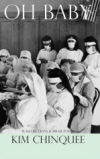Oh Baby
Those familiar with the writing of Kim Chinquee will be pleased to read the seventy-four flash fictions and prose poems collected in her book, Oh Baby, not only for the satisfaction of revisiting a few select, memorable pieces, but also for the opportunity to see Chinquee work at length, crafting with a spare and precise language the most complicated, emotional stories possible per page.
Those familiar with the writing of Kim Chinquee will be pleased to read the seventy-four flash fictions and prose poems collected in her book, Oh Baby, not only for the satisfaction of revisiting a few select, memorable pieces, but also for the opportunity to see Chinquee work at length, crafting with a spare and precise language the most complicated, emotional stories possible per page.
We can see this language at work in the first story, “Batter,” quoted here entirely:
I washed my grandma’s chickens, soaking bodies, stripping feathers, headless. Kool-Aid made me hiccup. My father yelled shutthefuckup. I pretended. My mouth was taped with duct tape. I caused my father’s ulcers. I was about to bat. The coach said I was bunting. I knew how. I was fast.
The first sentence seems simple enough. We imagine the narrator at the sink holding the birds underwater, plucking feathers from their cold skin. But then Chinquee disrupts the sentence with “headless,” suddenly breaking the pattern, and we pause to reorient ourselves against this new danger. It’s a quick pause, painless really, because it’s clear what “headless” modifies, but just long enough for us to realize that Chinquee is teaching us how to read: she expects us to participate in the making of the story. And we gladly do: Now we see danger in the threat from the father, in the exposed position of a batter preparing to bunt. Suddenly, a day in this child’s life takes shape. Here is a narrator, quick and smart, prepared to take us through each story, if only we can keep up.
The texts are beautiful, intricate pieces individually, but it is when they appear together that they begin to resonate, like chimes tuned to some higher natural frequency. What originally seem to be stories about a number of different narrators become the disordered chunks of one entire narrative. Of course, this particular reading depends upon a sympathetic reader, one willing to accept minor differences from one text to the next. It’s an idea worth entertaining, because the book functions much the same as its stories, each requiring the reader to make connections on his or her own. Just as we must make the blind step between seemingly unrelated sentences, so too must we leap between each fragmented story.
Such a reading takes us into a number of emotional situations in this narrator’s life. We see her as a child growing up on a farm, helping with chores, stealing beer with a friend, eating with her family at McDonald’s on a Sunday. She joins the military, gets married, has a son, and then divorces. We hear stories about the ex-husband and a number of boyfriends after him. We watch the son as a baby, and then the son grows older, dyeing his hair blue, lying in a hospital bed. The narrator describes some of the happiest moments she has experienced, as well as the saddest. But unlike a traditionally organized book, Oh Baby resists even this loose attempt to impose any sort of narrative order upon it, because it lacks a clear beginning and ending. What’s the importance, then, of such a thing?
For this reader, the answer lies in the story “Wagon,” again quoted here entirely:
After plowing, my father drove the tractor, and my mother and my sister and I sat on the wagon. When he stopped, we got off and collected stones, tossing them on. My hands got dry and callused, and we all got sunburned. Around lunchtime, my dad stopped the tractor, and my mom opened the cooler, and we all ate the sandwiches she’d mustered. We chugged milk. We threw stones onto the wagon, and when it was full, my dad drove us to the pile that had been there for generations. We unpacked. We added to the old pile, ridding ourselves.
Meaning comes not from the narrative itself, but from the act of storytelling, the clearing of the field for the next crop, the piling of stones. Through the accumulation of these small texts, Chinquee is able to connect with her readers, with generations past and present, in a unique way. The effect is freeing, for both author and reader, allowing us to rid ourselves of certain passive expectations so that we might better pick through the stories Chinquee has given us.





